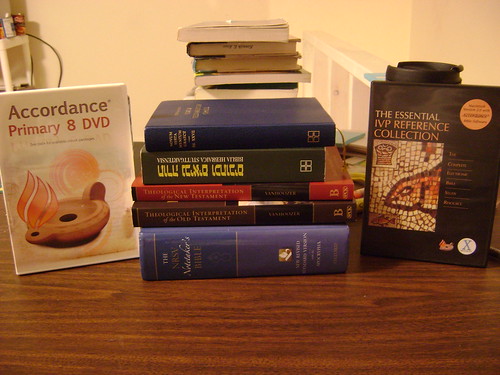We run our website the way we wished the whole internet worked: we provide high quality original content with no ads. We are funded solely by your direct support. Please consider supporting this project.
On Biblical Interpretation
Today we’re linking to a blog post from Rachel Held Evans about Biblical interpretation.
In her post, Rachel writes about the complexities Christians encounter when our scriptural interpretations differ (emphasis is Rachel’s):
What is perhaps most frustrating about engaging in such conversations within the evangelical community in particular, however, is that differences regarding things like Calvinism and Arminianism, baptism, heaven and hell, gender roles, homosexuality, and atonement theories often disintegrate into harsh accusations in which we question one another’s commitment to Scripture. In some cases, folks are so committed to their particular views on these issues they seem incapable of making a distinction between the Bible itself and their interpretation of it, and so any critique of that interpretation is seen as a critique of Scripture itself! And so we miss one another entirely.Instead of a lively, impassioned debate about the text, we engage in lively, impassioned debates about one another’s commitment to the faith.
She goes on to say:
For constructive dialog to happen, Christians must stop conflating differences in interpretation of Scripture with differences in commitment to Scripture. We must respond to one another’s questions, arguments, and ideas in kind, with more questions, arguments, and ideas, rather than avoiding the conversation altogether by dismissing one another as unfaithful.
We encourage you to click over and read the whole post. As you go throughout your day and interact with other Christians and debating various topics, these words are definitely worth remembering.
Related Reading

Getting Behind the “Letter” of Violent Portraits of God
“I will do to you what I have never done before… in your midst parents will eat their children, and children will eat their parents…” Ezek. 5:9-10 In my previous post I offered a brief review of Matthew Bates’ fascinating work, The Hermeneutics of the Apostolic Proclamation by Matthew Bates (Baylor University Press, 2012). Among other…

History and Bible: Do They Align?
To begin, it is significant that when Jesus and the authors of the NT referred to their sacred writings as “God-breathed,” they were referring to the writings that had been handed down to them. So too, the text that the Church has always confessed to be “God-breathed” has been the canon she received. Never has…

The Ultimate Criteria for Theology
Theology is thinking (logos) about God (theos). It is a good and necessary discipline, but only so long as it is centered on Christ. All of our speculation and debate about such things as God’s character, power, and glory must be done with our focus on Jesus Christ—more specifically, on the decisive act by which…

Is the Book of Acts Reliable?
(Note: We apologize that certain German vowels didn’t translate onto this site). Introduction The book of Acts is of critical importance in the contemporary debate about the historical Jesus. The reason for this is straightforward. Those who deny that the original, historical Jesus made divine claims for himself, performed miracles and rose from the dead…

Theology Matters
DugDownDeep_Carnahan.mov from Covenant Life Church on Vimeo. We found this fun video over at David D. Flowers’ blog and loved it so much we wanted to share it with you here. Thanks David!

Podcast: Should We Trust the Bible When it Fails on Page 1?
Greg talks about science and the Bible. http://traffic.libsyn.com/askgregboyd/Episode_0345.mp3

